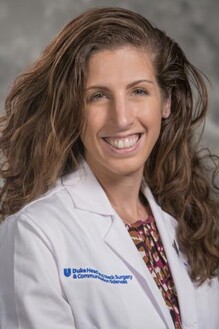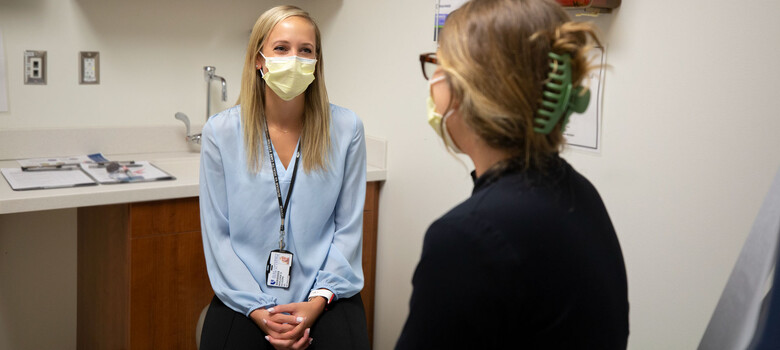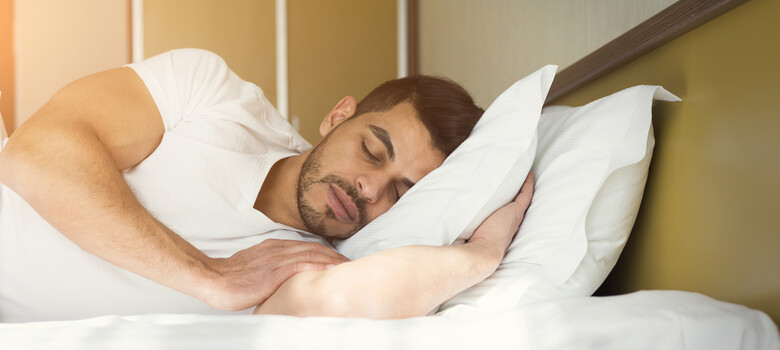Snoring Stops After Outpatient Sleep Surgery at Duke

Derek Saccoccio, 57, smiles in Durham, NC.
Within a year of his 2019 wedding, Derek Saccoccio found himself sleeping alone in his home office thanks to his loud snoring. When other efforts failed to curb his snoring, Duke Health’s Emily Commesso, MD, a specially trained sleep surgeon, shortened Saccoccio’s uvula -- the punching-bag shaped structure that hangs in the back of the mouth -- during an outpatient procedure. Six weeks later, Saccoccio snoring was gone, and he moved back into his bedroom. “The biggest benefit is being able to turn over in bed and see that your wife is right there beside you.”
Looking for Solutions
Sleeping apart from his wife put a strain on Saccoccio’s marriage. “It was not so much a health concern as it was a relationship concern,” said Saccoccio, who is 57 and lives in Durham. “Correcting that was important to me.”
He tried taking allergy shots to treat congestion that might be contributing. “That helped with my allergies, but it didn't help with my snoring,” Saccoccio said. He tried wearing a specialized oral appliance during sleep that was designed to project his lower jaw forward to open his airway, but that was a bust too. Saccoccio underwent a sleep study to test for sleep apnea -- the results were negative.
Then Saccoccio saw an ear, nose, and throat (ENT) doctor who finally identified the likely culprits. Saccoccio had a larger-than-average tongue and a long uvula. His tongue and uvula were touching during sleep, resulting in vibration and snoring.
The Biggest Bang for Your Buck
Saccoccio started researching surgical options. The most common result was a uvulopalatopharyngoplasty or UPPP, during which a surgeon removes or trims the uvula, removes the tonsils, and rearranges parts of the soft palate. This extensive surgery requires general anesthesia and potentially several nights of recovery in the hospital. UPPP is usually used to treat sleep apnea rather than snoring alone due to its risks and significant recovery. Operating room procedures can also be expensive, since snoring surgery is not always covered by insurance. When Saccoccio started looking for less-intense, outpatient options, he found Dr. Commesso at Duke.
Aiming for Meaningful Impact
Dr. Commesso recommended a two-step approach that started with shortening or trimming Saccoccio’s uvula, followed a few months later by a tongue ablation to tighten the tissue and reduce vibration/collapse. Both outpatient procedures can be performed in Dr. Commesso’s clinic office with local anesthesia.
“For snoring patients, we often need to address multiple areas from the nose down to the throat,” Dr. Commesso said. “Our goal isn’t necessarily perfection in terms of eliminating snoring altogether -- our goal is to make a meaningful impact on this person’s quality of life.” On December 2, 2024, Dr. Commesso trimmed Saccoccio’s uvula and sent him home.
Seeing Results
The initial recovery was painful, and Saccoccio continued to snore for several weeks. He used a phone app to record and measure the loudness of his snoring and found his average score ranged between 30 and 60, with higher scores indicating louder snoring.
One day about six weeks after the procedure, he woke up and his app showed a score of two. When he listened to the recording, “It was just this blowing out sound, which is so much better than the loud, obnoxious snoring that I used to have.”
Saccoccio said he’s thrilled with the results and has moved back into the bedroom he shares with his wife. He still wears the oral appliance at night, but he cancelled the planned tongue ablation because he didn’t need it anymore.
More Options Available at Duke
If you snore and want to do something about it, Duke offers snoring and sleep apnea surgical options that may not be available elsewhere. “Not only can we offer a larger variety of treatment options,” Dr. Commesso said, “but we really home in on the decision-making and patient-selection components to get the best outcomes.”




